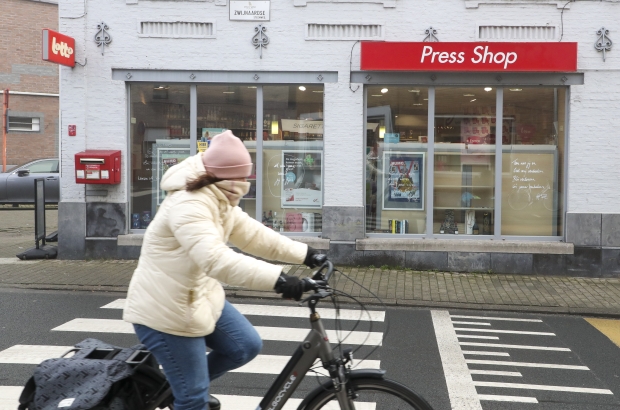- Daily & Weekly newsletters
- Buy & download The Bulletin
- Comment on our articles
Small shops struggle with workload as package pick-up points
Small retailers in Brussels are struggling in their efforts to serve as package pick-up points for bpost and other postal services, with some of them required to handle as many as 1,000 parcels in a single week.
From long queues and overworked employees to the chaos of hundreds of packages taking up precious retail space, many businesses are reaching a breaking point as a result of something they say should not be their responsibility in the first place, Bruzz reports.
At Librairie La Forestoise in Brussels, operator Kassim said eight in 10 people who walk through the door are only there to pick up a package.
“Every day I get about 600 to 700 parcels, accounting for about a third of the shop's turnover,” Kassim told Bruzz, adding that the number is so great that it is pushing the contents of his storeroom into the corridor of his attached home.
The business is hardly lucrative: Kassim’s income stands at about €0.40 per parcel. Rates vary according to the postal company and the weight and size of packages, and fluctuate between €0.15 and €0.90 per parcel collected.
La Forestoise is just one of the 950 collection points in Brussels. The pick-up points are often newsagents, electronics shops or grocers, but cafe, work clothes shops and even a dog supply shop also take in parcels.
Each postal point cooperates with one or more suppliers, such as bpost, DHL Express, GLS, Mondial Relay or DPD. Dutch delivery start-up Homerr also has several dozen pick-up points in Brussels.
And the number of collection points is on the rise: there were 600 at the end of 2017, 300 fewer than today’s number, according to figures from the Belgian Institute of Postal Services and Telecommunications.
While that data also includes automatic collection points with lockers, these are few (though also on the rise): there were 21 at the end of 2017 and 103 by the end of 2022.
More pick-up points are likely to come. Market leader Bpost said it wanted to expand its Belgian network from 3,100 to 4,000 collection points in the coming years, “providing an answer to the growing parcel volume, but also offering a fully-fledged alternative to home delivery,” according to spokeswoman Fanny Mindombe.
An estimated 80% of customers choose home delivery today, but the formula causes headaches: not only is it more expensive for the postal service, it also creates more traffic, air pollution, and the headaches of double parked delivery vans.
But demand is only increasing. Between 2017 and 2022, the number of parcels handled by Bpost in Belgium tripled from 190,000 to 550,000 a day. The growth continued last year as well.
A large part of the increase can be attributed to the rise in online shopping. In 2022, online shopping in Belgium rose by 22%, according to the latest annual report of BeCommerce, the umbrella organisation of e-commerce in Belgium – even more than the pandemic years of 2021 and 2020, when brick-and-mortar shops were partially closed.
For small businesses that become pick-up points for parcels, the extra income sometimes changes their entire model.
"During Covid, the gallery activity fell silent," art gallery manager Rafael told Bruzz.
"After that, we offered some painting courses. But when the artist stopped, I had to find another income. After all, I also have to eat.
"Four months ago, I started with parcels. Every day I get about 150 of them and I can just live on that. Maybe I'll take lottery products or money transfers soon.”
There are few paintings hanging in the gallery now, only piles of packages stacked everywhere, awaiting pick-up. It is a story repeated all across the Belgian capital, Bruzz found.
“Once, petrol stations were considered the ideal place where you could also pick up parcels,” said Gino Van Ossel, a professor of retail at Vlerick business school.
“There, too, many operators have backed down. Sometimes this is because it’s simply not profitable, but often the so-called opportunity cost also weighs in – if there’s such a long queue for parcels that other customers turn right around, that's a problem.”
Economic geographer Joris Beckers pointed out that many supermarkets divested their parcel business for this exact reason.
“Ecologically, supermarkets are a great choice because it allows people to do their shopping right away,” Beckers said.
“But parcels often get in the way of the main business there. Businesses with a good business model will not easily add parcels.”
When it comes to parcel vending machines, some cities are now trying to take matters into their own hands and have a voice in the process. Mechelen, for instance, together with Bpost, looked at which 50 locations in the city could have delivery machines.
In the future, Heleen Buldeo Rai (VUB-Mobilise) expects a debate on what place these parcel machines can occupy in public spaces.
“The challenge will be to get postal companies to cooperate so that we avoid a proliferation of vending machines per postal company,” Buldeo Rai said.
Photo: Nicolas Maeterlinck/Belga

















